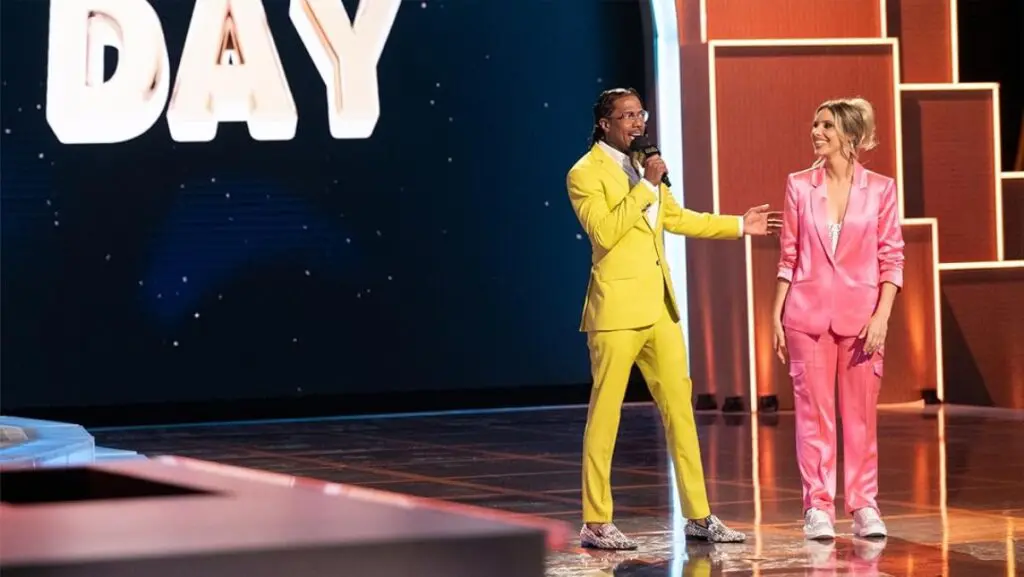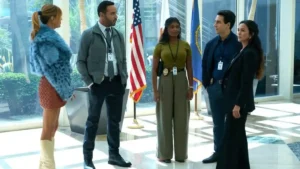Summary
While it’s easy to laugh at the contestants wishing for insane items off a single online store, this quickly develops into an insidious and unsettling feeling that all this is just an elaborate demonstration of Amazon’s monopoly and power.
Amazon is a company that needs no introduction, known to many as the monolithic e-commerce store (though its most important product is Amazon Web Services), selling a large variety of products ready to be shipped to the buyer’s door with only a day’s notice. It of course has its fingers in plenty of different ventures, most notably Prime Video streaming. It’s something that’s grown to rival even Netflix and traditional entertainment studios, showing the power of Amazon’s reach. But before now Amazon hasn’t not sought to integrate it’s e-commerce side together with Prime Video, though that’s something Wish List Games seeks to change.
Harnessing the data gathered from people wishlisting items from the Amazon store, Amazon has turned this into a gameshow where people play for items on their wishlists, up to the value of $25,000. This will of course then be released on Amazon’s streaming service It’s a genius (though dystopian) idea, demonstrating the power of interlinking different aspects of Amazon, and just how humongously big it truly is.
Hosted by the self-proclaimed “King of Wishes” Nick Cannon and Lele Pons, the format of the show has three individual people come up to play one of five games to try and win items from their wishlist. At the end, one of the audience members players a game ordering films, books, songs, TV shows, and board games by release date, and the prize for winning is a “generous” gift from Bezos, such as a 55 inch Fire TV and more.
It has to be said that the energy that Cannon and Pons bring to the show helps to liven it up immensely, despite the simplicity of the games audience members play. Audience members are similarly animated, and that can’t help but rub off on the viewer too. It helps prevent waning viewer interest, as boredom will undoubtedly set in when the games actually begin. As while they’re labelled as signature to the show, they’re nothing of the sort.

Nick Cannon and Lele Pons hosting Amazon’s Wish List Games
Firstly, the show only has five to rotate around for the five episodes, making them get stale and repetitive quite quickly but, worse, they’re nothing more than rehashes of popular games. One is just one-person Jenga, another is a simple matching game, there’s the repeat the musical sequence, launching coins into a wishing well, and, by far the hardest and most unfair, a simplified version of curling. If Amazon hopes to keep granting wishes (as stretched as that is, these wishes only granted upon winning), they’ll need to come up with a bigger and more inventive suite of games.
Something that viewers won’t be prepared for is the absurdity of some of the items people put on their wishlist. Some of this stems from the fact that there can only be a maximum of ten items, which drives contestants to want big, expensive, items rather than lots of smaller ones, but most of it is that people can pull out an absolute wildcard with what they want from Amazon. It turns out Amazon sells absolutely everything a person could think of, up to and including the kitchen sink. This is something of a revelation, that if someone really wanted to, they could buy an oven, bunk bed, dining table, swing set, or even a wedding ring off Amazon.
There is the initial thought of “Who goes on Amazon to buy a kitchen sink?” and laughing at these people, but as the insanity of people’s wishlists keeps going, a deeper, more unsettling, realisation sets in. In many people’s minds, Amazon has replaced the many different shops. Gone are the jewellers, furniture stores, kitchen retailers, electronics, hardware, etc from everyone’s thoughts; in its place is just Amazon, the one-stop shop for everything. It’s a terrifying thought that will wake up audiences to the reality of what they’re watching, a megacorp flexing its muscles and showing that it has won, and is in complete control.
Cannon isn’t the King of Wishes like he claims, Jeff Bezos is. This show is turning people’s dreams to afford luxuries (in rare cases, expensive needs as parents and caregivers attempt to get beds for loved ones) into content, using data Amazon collect from its users. We only play and win at Bezos’ behest, and end up as content for consumption on his own platforms. After all, $25,000 to Bezos and Amazon is nothing more than the minutest drop in an extremely vast ocean.




